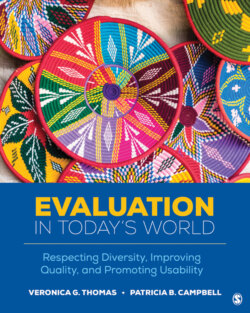Читать книгу Evaluation in Today’s World - Veronica G. Thomas - Страница 113
На сайте Литреса книга снята с продажи.
Introduction
ОглавлениеTo date, there have only been modest efforts to comprehensively chronicle the historical evolution of evaluation. Historical knowledge of evaluation provides greater clarity on how and why the field has evolved as it has today. Additionally, historical knowledge enables one to discern the conditions, at particular points in time, in which evaluation flourished or stagnated and, ultimately, may stimulate thinking that shapes the progression of theoretical perspectives and practices, especially related toward working more effectively in diverse and vulnerable communities.
Over 40 years ago, Glass and Ellett (1980, p. 211) stated that “evaluation, more than any science, is what people say it is; and people currently are saying it is many different things.” Even today, we contend that if you ask a sociologist what program evaluation is, you will likely get a very different answer, focusing on different things, than if you ask an economist; and their answers both likely differ from how an epidemiologist, educator, or psychologist defines program evaluation. Our definition of evaluation has elements of many of the various definitions of evaluation provided in Chapter 1 but also includes distinctive features:
Evaluation is a disciplined inquiry involving the systematic, contextually responsive, and ethical application of research tools and methods to collect data that assess the effectiveness and operations of programs within the various social, political, and cultural contexts in which they operate. Evaluation’s ultimate goal is to provide credible evidence that fosters greater understanding and improves decision making, all aimed at improving social conditions and promoting healthy, just, and equitable communities.
Because multiple disciplines contributed to evaluation as currently understood and practiced, unifying its historical roots is not an easy task. The history of evaluation, like histories of many topics, differs depending on who is telling the story and the disciplinary background of the writers (Mertens & Wilson, 2019). A common misconception in writing a history chapter is that it simply involves finding out what happened and then documenting those events in chronological order. Undoubtedly, documenting notable evaluation-related events in temporal sequence can be useful because knowing the order in which events occur can help us understand potential causes (or influences) and effects of those events. This, in turn, allows us to step back and view the “big picture” of evaluation history. In this chapter, we seek to present a more inclusive history of evaluation than is generally presented in other evaluation books and to weave together a story of consequential events in the growth of evaluation.
